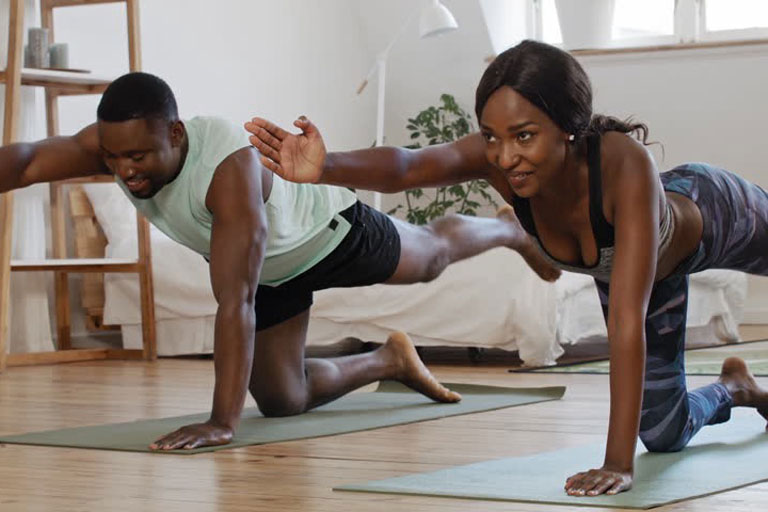May 13, 2020
When COVID-19 arrived in the U.S., it hit fast and hard. For many people, life came to a halt, and they found themselves with more restrictions but also more responsibilities and mental strain.
How Americans mentally coped during the beginning of the pandemic, and how they are continuing to cope with the rapid changes impacting everyone’s lives, is the focus of a study led by Melissa Cyders, associate professor at the School of Science at IUPUI, and Martin Plawecki, associate professor of psychiatry at the IU School of Medicine. Two graduate students in the PhD program in clinical psychology, Christiana Prestigiacomo and Melissa Liu, are coordinating the project.
“We wanted to know how people are coping with this unprecedented time,” said Plawecki. “We believe this will help us to better understand who is at risk and how we as health professionals can help.”
The initial stage of the study consisted of a March 26 survey of 500 adults, ranging from age 19 to 78, across 47 states. Initial findings from these data were recently reported by The Conversation and are being prepared for peer-reviewed scientific publication.For the most part, participants were taking the epidemic in stride. Most coped with social distancing measures by watching television (276 participants), talking with friends (217 participants) and exercising or participating in physical activity (210 participants).
Some of the most effective coping strategies, Cyders said, included problem-solving, exercising, engaging in hobbies and focusing on things they are thankful for. These strategies, she said, were associated with lower self-reported stress and better self-reported coping.
Others, however, had less effective ways of coping with the virus, including withdrawing and avoiding talking to others, stress eating, avoiding thinking, talking about problems and drinking alcohol. These were associated with more stress and worse coping.
“Overall, we were pleasantly surprised about how well people were coping in general,” noted Cyders. “However, it struck us how there were sociodemographic groups that were not coping as well. This places them at risk to be overlooked during this pandemic and to experience serious negative outcomes during this time.”
One key group included those who drink heavy amounts of alcohol. Almost a quarter of current alcohol drinkers in the sample reported drinking more heavily since the pandemic. These increased rates place them in riskier drinking levels, including “binge drinking” (women drinking 4 or more drinks and men drinking 5 or more drinks on one occasion), which is associated with worse health outcomes. The increase was attributed mostly to boredom or dealing with stress. Those who were drinking more tend to live in urban or suburban areas, are quarantined with others and report more stress and worry about the pandemic.
On the other hand, about 30 percent of drinkers reported drinking less alcohol since the start of the pandemic, mostly due to not being allowed to go to bars or restaurants, trying to save money and as an effort not to suppress their immune system.
“Although there are definitely some people drinking to dangerous levels right now, it’s not as rampant as social media and news reports might suggest,” said Prestigiacomo. “It could still be enough to decrease immune system function and increase COVID-related complications, though.”
The pandemic has caused many people to lose their jobs. As of March 16, 2020, roughly 26.4 million Americans had filed for unemployment. In the survey, about 35 percent of respondents reported changes in their employment. Those participants reported being more worried about the pandemic and about becoming ill. Those who reported no changes in their employment were coping better with changes brought on by the pandemic than their changing employment counterparts.
“As more people start to be laid off or lose jobs, coping is likely to be worse,” said Liu.
In addition to people losing jobs, many people found themselves working from home. This shift has impacted many people’s mental health, particularly women. When it comes to gender, Cyders and Plawecki found that women reported worrying more than men – 66 percent compared to 56 percent of men – and reported coping less effectively than men. Researchers suspect the difference is in part to the unequal caregiving responsibility. Of the participants, more women reported taking care of kids, experiencing a loss of privacy and personal time and struggling between work and family responsibility.
Women also reported engaging in more coping strategies than men by seeking out support, engaging in faith practices and focusing on what they are thankful for.
“Women appear to be shouldering more of the burden, or at least the stress of the burden,” said Liu. “Working from home is clearly a great option for people to maintain employment, but it does come with its own share of concerns and difficulties that we hope to track over time.”
Funding from IU’s Office of the Vice President of Research will allow for further tracking of these patterns over time, Cyders said, as the pandemic changes and shutdowns continue or are phased out. The team will continue to track Americans’ mental health over the next six months to follow changes in trends and determine how best to provide support.




